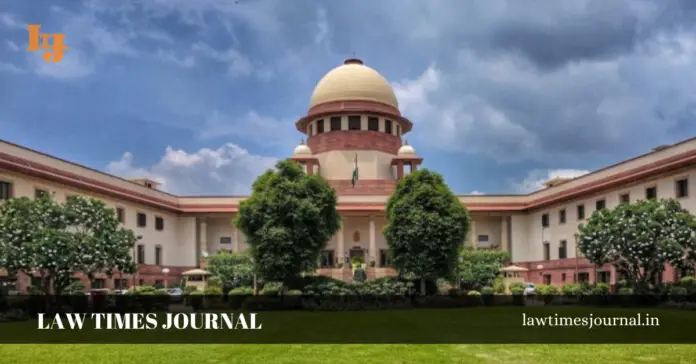
The Uttar Pradesh Public Services Act, 1994 deals with the reservation in the posts of public services and promotions. The State Government wanted to remove this reservation and published Governmental Orders for the same. It was disputed by the petitioners belonging to the reserved classes through Writ petitions filed before the Uttarkhand High Court. The Hon’ble Apex Court held that the State need not collect the data for removing the reservation criteria as the State is already aware of its decision regarding reservation.
The Controversy in the Appeals pertains to the reservations to Scheduled Castes and Scheduled Tribes in promotions in the posts of Assistant Engineer (Civil) in Public Works Department, Government of Uttarakhand. The Uttar Pradesh Public Services (Reservation for Scheduled Castes, Scheduled Tribes and Other Backward Classes) Act, 1994 (for short “the 1994 Act”) provided for reservation in public services and posts in favour of persons belonging to Scheduled Castes, Scheduled Tribes and Other Backward Classes of citizens. Section 3(1) of the said Act stipulated reservation at the stage of direct recruitment. According to Section 3(7) of the 1994 Act, the Government Orders providing reservation for appointment to public posts filled up by promotion which were existing on the date of commencement of the 1994 Act shall continue till they are modified or revoked.
Facts of the case
The State Government decided that all posts in public services in the State shall be filled up without providing any reservations to Scheduled Castes and Scheduled Tribes. All Government Orders to the contrary were superseded by the proceeding dated 05.09.2012. Mr. Gyan Chand who was working as Assistant Commissioner (Civil), State Tax and belonging to Scheduled Caste Community filed a Writ Petition for quashing the proceeding. The High Court observed that it is not necessary for the State Government to collect quantifiable data regarding representation of Scheduled Castes and Scheduled Tribes in State services or regarding their backwardness before providing reservation in their favour in promotion posts. The High Court was of the opinion that the judgment in Vinod Prakash Nautiyal (supra) related to the constitutional validity of Section 3(7) of the 1994 Act alone and the Notifications pertaining to reservation in promotion in favour of Scheduled Castes and Scheduled Tribes were not set aside. Vinod Kumar and three others belonging to the Scheduled Castes working in the Public Works Department, Government of Uttarakhand filed a Writ Petition in the High Court of Uttarakhand seeking a direction to the Respondent therein to prepare a separate list of eligible candidates as per Rule 5 of the Uttarakhand Promotion by Selection (on posts outside the purview of Public Service Commission) Eligibility Rules, 2003 and to prepare a separate list for each category of eligible candidates of General, Scheduled Castes and Scheduled Tribes for promotion to the post of Assistant Engineer (Civil) in Public Works Department. A further direction to the State Government was sought to hold a departmental promotion committee for promotion to the posts of Assistant Engineers after providing reservation to Scheduled Castes and Scheduled Tribes in accordance with the Government Orders dated by which reservation was provided in promotion. The Writ Petition was disposed of by the High Court with a direction to the State Government to implement reservations in promotion by promoting only members of Scheduled Castes and Scheduled Tribes in future vacancies to maintain the quota earmarked for the said categories. The High Court clarified that the State Government is obligated to collect quantifiable data regarding inadequacy of representation of the Scheduled Castes and Scheduled Tribes in state services before providing reservation in promotion. The High Court clarified that it is not necessary for the State Government to collect data regarding backwardness of the Scheduled Castes and Scheduled Tribes in the light of the direction of this Court in Jarnail Singh (supra). The High Court also observed that the State is not obligated to provide reservation in promotions to members of Scheduled Castes and Scheduled Tribes as Article 16(4-A) of the Constitution is an enabling provision. It is abundantly clear from the judgments of this Court in IndraSawhney, Ajit Singh (II), M. Nagaraj and Jarnail Singh (supra) that Article 16 (4) and 16 (4-A) are enabling provisions and the collection of quantifiable data showing inadequacy of representation of Scheduled Castes and Scheduled Tribes in public service is a sine qua non for providing reservations in promotions. The data to be collected by the State Government is only to justify reservation to be made in the matter of appointment or promotion to public posts, according to Article 16 (4) and 16 (4-A) of the Constitution. As such, collection of data regarding the inadequate representation of members of the Scheduled Castes and Schedules Tribes, as noted above, is a pre requisite for providing reservations, and is not required when the State Government decided not to provide reservations. Not being bound to provide reservations in promotions, the State is not required to justify its decision on the basis of quantifiable data, showing that there is adequate representation of members of the Scheduled Castes and Schedules Tribes in State services.
Order of the court
The High Court was not informed about the appointment of a Committee for collection of quantifiable data and the completion of such exercise by the Committee, which was approved by the State Cabinet. However, the State Government took a conscious decision not to provide reservation in promotions. The direction given by the HighCourt to collect quantifiable data, therefore, is wholly unnecessary as the State is already in possession of the said data.
In view of the aforesaid, the impugned judgments of the High Court in Writ Petition (S/B) No.351 of 2019, Writ Petition (S/B) No.117 of 2019 and Review Application No.389 of 2019 in Writ Petition (S/B) No.117 of 2019 are set aside.
The Appeals are disposed of accordingly.
Edited by Pragash Boopal
Approved & Published – Sakshi Raje








